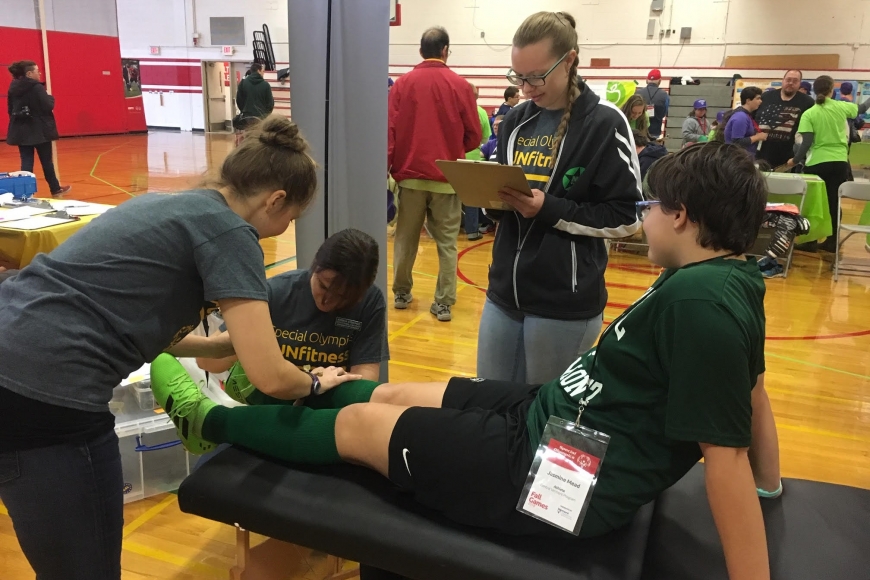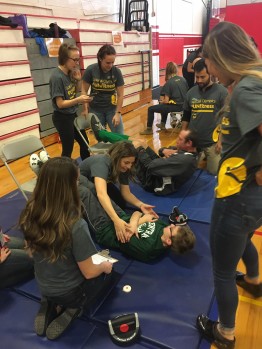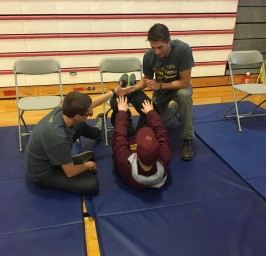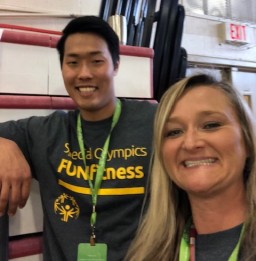IT TAKES A VILLAGE

“It takes a village to raise a child”
 It’s an African proverb that we’ve all heard before, highlighting the importance of the community with helping children to experience the world and grow in a safe environment. Nowhere is that more true than in the world of Special Olympics. Many of us know that Special Olympics provides athletic opportunities for people with intellectual disabilities (ID), but don’t realize that it does so much more. Special Olympics also provides opportunities for people with ID to experience leadership, success, and community inclusion, as well as develop the skills to act and live independently. Most importantly, Special Olympics allows people with ID to access necessary healthcare services through regular screenings at sporting competitions. It may come as a surprise to you that even in the US, people with ID are greatly under-served when it comes to healthcare – while socioeconomic status plays a role, the great majority is due to bias that health conditions are a result of IDs, as well as the inability of people with ID to advocate for their needs.
It’s an African proverb that we’ve all heard before, highlighting the importance of the community with helping children to experience the world and grow in a safe environment. Nowhere is that more true than in the world of Special Olympics. Many of us know that Special Olympics provides athletic opportunities for people with intellectual disabilities (ID), but don’t realize that it does so much more. Special Olympics also provides opportunities for people with ID to experience leadership, success, and community inclusion, as well as develop the skills to act and live independently. Most importantly, Special Olympics allows people with ID to access necessary healthcare services through regular screenings at sporting competitions. It may come as a surprise to you that even in the US, people with ID are greatly under-served when it comes to healthcare – while socioeconomic status plays a role, the great majority is due to bias that health conditions are a result of IDs, as well as the inability of people with ID to advocate for their needs.
Eunice Kennedy Shriver, who started the Special Olympics in 1968, recognized this fact when she took her sister Rosemary to the dentist and was told that the only answer to her sister’s tooth decay was to remove all of her teeth. Eunice knew this option was only offered because her sister had ID and found a dentist that would help Rosemary rehabilitate and keep her teeth, allowing her to eat normally for the rest of her life. Eunice then helped Special Olympics launch Healthy Athletes in 1997 to provide screenings for people with ID in many different health disciplines – general health, dentistry, optometry, audiology, podiatry, physical therapy, and sport psychology. Special Olympics is not only the largest sports organization in the world, but also the largest health organization worldwide  because of the millions of volunteers across the globe who donate their time to ensure that the 11 million athletes can train, can compete, can be successful, can be leaders, and most importantly, can be healthy to live long and full lives.
because of the millions of volunteers across the globe who donate their time to ensure that the 11 million athletes can train, can compete, can be successful, can be leaders, and most importantly, can be healthy to live long and full lives.
Last weekend, I spent my Saturday at the Special Olympics VT Fall Games with my fellow PT360ers, local therapists, and UVM PT students for the FunFitness Screenings. Although we work for different clinics locally or, in the case of the PT students, are at different points in our careers, we all were united with one common goal – to provide physical fitness screenings for the 500 Special Olympics VT athletes that were competing that weekend. I’ve worked the event for five years and have been a co-director for the past three, and it always amazes me how many people volunteer for the Special Olympics. There are about as many volunteers as athletes - helping officiate the competitions, run the health screenings, provide food & water, and just support the athletes by cheering them on. This year was no exception and we had the largest turnout for FunFitness volunteers with 60+ UVM PT students, med students, licensed therapists, and general volunteers. It really re-iterated the “it takes a village” concept to me – we had complete strangers working together to provide healthcare to people they had never  met before but would probably never forget. I know that I never have and I love to see the same athletes return from year to year, excited to beat their "scores" from the year before.
met before but would probably never forget. I know that I never have and I love to see the same athletes return from year to year, excited to beat their "scores" from the year before.
Vermont may be one small piece of the Special Olympics community but these events are repeated all over the world, creating a global community that raises people with ID in an environment of inclusion and success, just as we would want for any child.


